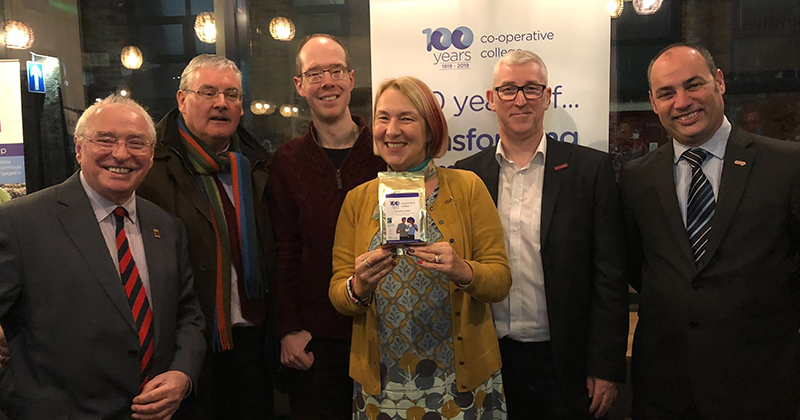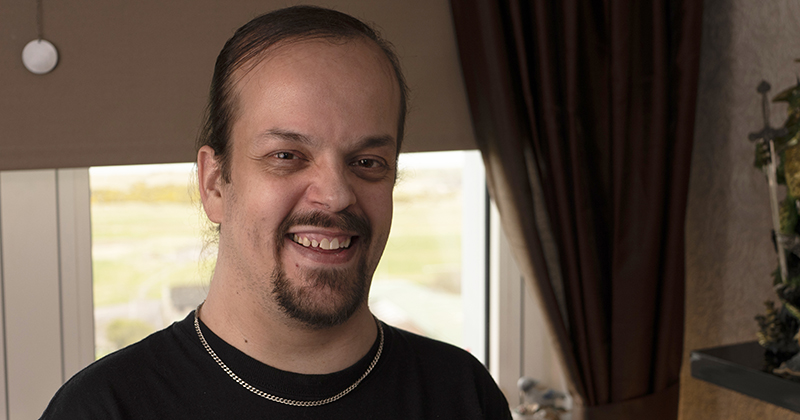Simon Parkinson, chief executive and general secretary of the Workers’ Educational Association, has been a lifelong learner himself. He tells Jess Staufenberg why a ‘community learning centre’ in every town must be delivered on now
Simon Parkinson, chief executive and general secretary of the Workers’ Educational Association (WEA), took over at a time of relative crisis for the almost 120-year-old organisation.
He was happily in his first chief executive post at The Co-operative College in Manchester when he was asked to apply for the top job at the WEA, driving its next steps as a specialist in community learning for adults.
The charity, with outgoing boss (and passionate proponent of adult education) Ruth Spellman at the helm, was having a wobble. After years of being directly grant funded, the government announced in 2017 that the regions would get devolved adult education budgets.
In one fell swoop, about one-third of the WEA’s guaranteed government funding, roughly £7 million out of a £19 million contract, was under threat (the rest of its income is from charitable fundraising and learner fees).
Parkinson clearly remembers walking into the interview to joyously congratulate the team on retaining six out of seven of its original contracts– the WEA had only lost Cambridge and Peterborough. But he was met with long faces.
“I believe, understandably, that it absolutely wobbled the organisation,” he tells me. “The thinking was that this could be the start of the end of statutory funding. You know, it will be Cambridge and Peterborough today, then Liverpool, Manchester, tomorrow.
‘It did paralyse the organisation a little bit. It’s not a criticism – we’d been delivering in those communities for over 100 years.”
The general policy landscape was also pretty brutal. Readers will be familiar with the figures, but as a fun recap: in November the Institute for Fiscal Studies revealed adult education funding has been slashed by 49 per cent between 2009 and 2019, and that even with recently announced additional funding, the total will still be one-third below 2009 levels.
But Parkinson also joined the WEA almost exactly two years ago this month, around the time the cabinet, if not quite the Treasury, began singing from a new hymn sheet. You can now barely read a Department for Education press release without “lifelong learning” cropping up somewhere.
And if anyone knows what lifelong learning means, it’s Parkinson.
Time and again, he has built his career with employers who regularly invested in their workers as learners, meaning he completed both his bachelor’s and master’s degrees because someone senior believed in upskilling him.

As a 16-year-old, however, the aim was not so lofty. The teenage Parkinson, who had achieved six O-levels at school, simply wanted to get a job he wouldn’t lose.
“Looking back, we didn’t want for anything, it was just a traditional working-class family,” he grins, describing a full home of four children growing up in Salford. It wasn’t an overly political household (“you knew you were red – Labour and Manchester United – but that was it”), but events of the 1980s soon made themselves felt.
“My dad was made redundant. He never found himself a full-time job after that, and he wasn’t unique in that. He never really recovered from that.”
It was Parkinson’s dad who accompanied him to buy a suit for his two job interviews: one with Barclays Bank and one with the local authority. Soon he had a letter back from Barclays, saying they were finalising their successful applicants.
“I thought it was a nice letter, but my dad looked at it and said, ‘that’s a no,’” chuckles Parkinson. When he got a job offer from the local authority instead, the family considered it a real win.
“My dad’s view was, ‘the local authority, that’s a job for life! You’ve done well there, son.’” A few months later, Barclays got back in touch saying they had a job for him, but Parkinson wouldn’t be budged.
“Wanting the security of employment was more important than the money, because you didn’t want to be out of work,” he explains. “There was a massive stigma. I didn’t want to be on the dole.”
In a move that seems unthinkable now, Salford City Council then funded Parkinson through his first degree when he was 18, qualifying him as a building surveyor. “I must be the least talented building surveyor there is,” he chuckles again – but the qualification took him interesting places.
He interviewed with Golden Lane Housing, the property arm of Mencap, the huge national charity supporting people with learning disabilities. From the interview onwards, he was “hooked”, he says – in part because his boss, Jan Tregelles, was a deeply inspirational leader – but also because the cause lay close to his heart.

His parents were foster parents and had adopted his brother, Gary, who has Down syndrome.
“Once he came to us as a baby, I don’t think my mum could ever let him go.” Although his brother was never directly bullied, Parkinson’s peers sometimes called his brother a “retard” – nowadays considered a completely unacceptable word for anyone with neuro-developmental or physical differences – behind his back. “I had an awareness of learning disability,” he nods.
Over the course of a decade, Parkinson helped buy 100 properties a year for Mencap, so that people with learning disabilities could live in them independently.
“We came up against a fair share of prejudice as well, with people who were really nervous about someone with a learning disability living on their street,” he continues. “It was about breaking down those stereotypes.”
Next, he worked on helping them access education and employment. This was partly possible through three specialist residential colleges Mencap owned at the time: Dilston College outside Newcastle, Lufton Manor College in Somerset and Pengwern College in north Wales.
From the way Parkinson talks about it, it was clearly inspiring work: the team were throwing open doors for people with learning disabilities at a time when the awful treatment of them in other contexts was being rapidly revealed.
He remembers the Budock Hospital scandal in Cornwall in 2006, which found “widespread institutional abuse” of people with learning difficulties. The scandals continue today: just last month, a family reported that their autistic son in care was being fed meals through a hatch.
“We could just decide, as a society, to just stop this,” grimaces Parkinson. “The way to provide people with a better life is there now.”

Once again, Parkinson was able to continue with his lifelong learning, as his boss sent him on a master’s in public administration at the University of Warwick. It was “fantastic” and “paid back, because I stayed for 19 years in the end!” he laughs.
It was only when he was ready to be a chief executive himself that he looked elsewhere. This took him to the Co-operative College in Manchester, helping workers access education and training, before joining the WEA.
Parkinson’s lifelong learning, and close work with the most vulnerable learners, makes him a fierce defender of community adult education. The government may be recent converts to that cause, but it is relying on an FE sector that is largely focused on young people – as Parkinson points out.
“Part of the issue is that colleges are generally seen as provision for 16-to-19-year-olds,” he says. “People returning to learning in their 30s and 40s are scared of being the oldest person in the classroom.”
Instead, the WEA is one of nine specially designated ‘Institutes for Adult Learning’. These are adult learning organisations that support about 130,000 adult learners each year: City Lit in London, Fircroft College in Birmingham, the Mary Ward Centre in London, Morley College in London, Northern College in Yorkshire, Richmond and Hillcroft Adult Community College in London, Ruskin College in Oxford and WM College (Working Men’s College) in London.

What makes institutes for adult learning different is the greater variety of courses available than in general FE colleges, continues Parkinson.
As he puts it: “The reason the WEA has survived for over 100 years is we’re genuinely responsive to meeting adult learners’ needs. That doesn’t mean sitting here and saying, we only deliver level 2 technical qualifications.
“People trust us to respond to their needs. Maybe that starts on a cookery course.”
The question now is whether the institutes of adult learning will need to prove their outcomes in line with government skills agendas in order to keep winning contracts. This year the WEA won nine out of ten contracts it bid for, but failed in the Tees Valley Combined Authority.
This has clearly frustrated Parkinson, but he’s up to the challenge, bolstered by the fact learners in the area are still turning to the WEA via its online offer (6,000 courses are now online).
“Increasingly, we need to show the impact community learning has,” he tells me. “It gets stereotyped as old people doing the same thing again and again, and that’s just not true. We’ve got to carry on fighting.”

As we conclude he points out, eyes gleaming, that in 2020 the education select committee called for a ‘community learning centre’ in every town, as a way to actually deliver on the ‘lifelong learning’ commitment.
“Think of all the retail outlets that have closed down that are sat empty!” he says enthusiastically. “Why can’t we have a community learning centre in every town? It could be the Sure Start for adults.”









Your thoughts